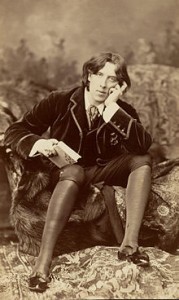[contextly_auto_sidebar id=”vfSOI90RO2KEYpq5eSwBZ2d7FDDUHrCx”]
IT may be an unanswerable question, but it’s one I’ve been brooding on a lot lately: To what extent is art a disinterested inquiry — the search for some kind of human truth — and to what extent does it offer some kind of extra benefit that soothes artist or audience? That issue, which I’ll get into more fully in an upcoming article, has been discussed for centuries, and it’s coming into focus again because of a book by Swiss philosopher Alain de Botton, Art as Therapy.
De Botton was part of a program on CBC Radio hosted by Jian Ghomeshi, which covered both sides of the argument.
Much of the criticisms of de Botton’s ideas is that they take a reductionist view of art, but he sees no reason art should exist outside practical life.
“You can value art in all its complexity, and at the same time say, ‘That picture has a purpose, that sculpture does something to us,'” he said.
Of course, for much of art history, art has been seen as having a purpose — part of a harvest festival, an advertisement of a nobleman’s power, and so on — with “arts for art’s sake” being the exception. Oscar Wilde fought very hard to prove that aesthetics were were higher than ethics; I followed him for a long time. But it’s fair to say the issue is being worked out in new ways today. More later on this big subject.
ALSO: English comedian Eddie Izzard, who cross dresses less often these days, is on another big tour. An NPR report gets into all the things he’s up to these days — running dozens of marathons, learning German, Russian and Arabic so he can perform in numerous languages.
I was lucky enough to speak to Izzard a few years ago, before his performance at the Hollywood Bowl. Impressive dude for sure. For my story, we mostly spoke about his influences:
Izzard’s roots were in a line of British comedy that has remained obscure in the United States even while exerting an international influence: One of his first heroes was Spike Milligan, who created and starred in “The Goon Show,” a wacked-out 1950s British radio program that also featured Peter Sellers.
“I think he’s the godfather of alternative comedy, of surreal comedy,” Izzard says of Milligan. “He influenced Monty Python, which influenced ‘The Simpsons,’ with his weird juxtapositions.”
My son, who heard the NPR segment while we drove to his elementary school, was fascinated by the fact that “comedian” chimed with “chameleon,” and “Eddie Izzard” rhymed with “lizard.” Maybe the lad is onto something.


Eddie Izzard is a paid-up supporter of Iraq warmonger Tony Blair. He even made a guest appearance as the compere at a rally for Blair, which attempted to reassess his record:
http://www.counterfire.org/index.php/articles/opinion/15907-never-let-them-bury-the-truth-about-tony-blair
Izzard is a vile man who can laugh about Darth Vadar – whilst actually supporting Vadar’s methodology in real life.
Well, if we start to assess our artists or entertainers by their politics, we start to remove a lot of very substantial people. Including many on the left, I’m sorry to admit.
I cannot condone Izzard’s vile war-mongering merely because he tells a few jokes.